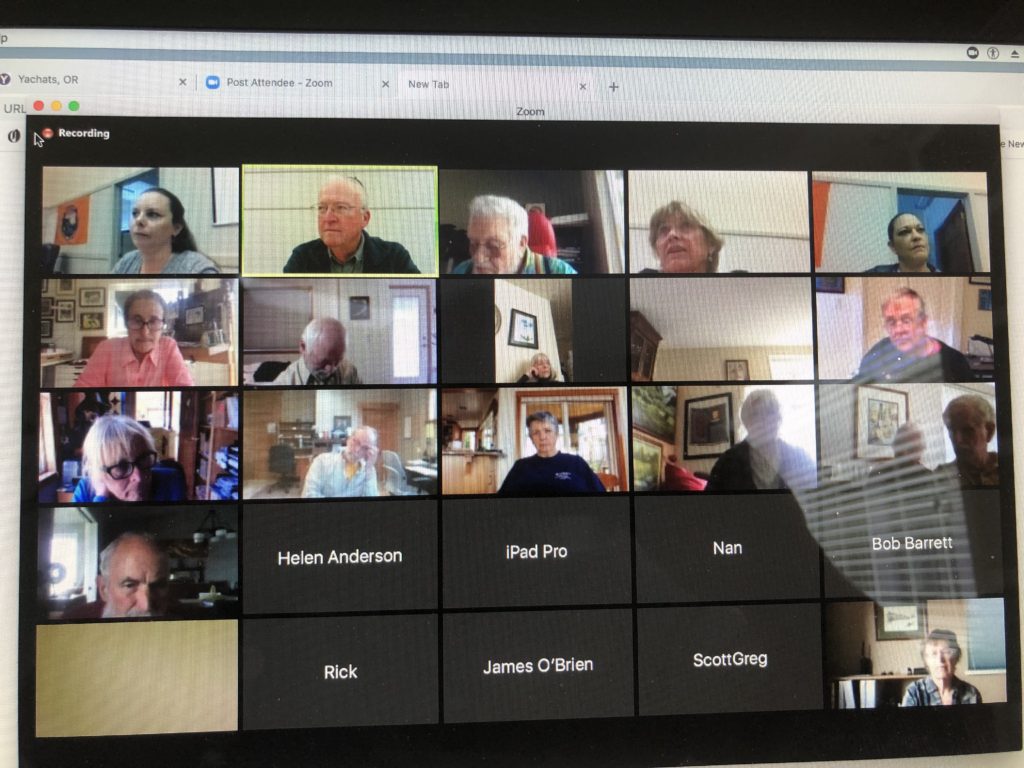
By QUINTON SMITH/YachatsNews.com
The Yachats City Council on Thursday approved funding a loan program for small businesses to help them survive the state-imposed COVID-19 shutdown.
The $100,000 program would be administered by a Springfield-based nonprofit called Community Lending Works, which would charge the city $4,000 to administer 2 percent business loans for up to four years.
The city did not say where in the budget the money would come from.
The nonprofit specializes in helping startups and businesses which might not normally be able to get a loan from for-profit banks.
The 5-0 vote came during the council’s first meeting in more than a month, held online through the Zoom virtual meeting platform. During the two-hour session up to 42 people listened, watched and asked basic questions via their home computers or cell phones.
The vote came after council discussed two proposals forwarded by a group organized by Yachats Community Presbyterian Church, which has established two robust relief funds for laid-off workers and shuttered businesses.
The church group asked the city to consider refunding last quarter’s food and beverage tax – estimated to be near $90,000 — to restaurants and stores which collected the tax and to also use lodging taxes to contribute to the church’s business relief fund.
Although councilors applauded the church for its efforts and encouraged residents to contribute, they said it didn’t want to refund taxes collected from customers to restaurants or use lodging taxes to support the church’s efforts.
In a long memo to the council, city manager Shannon Beaucaire said there could also be separation of church and state issues with the city donating to the church’s business relief program. But the council had already approved donating up to $5,000 – but the city hasn’t yet written a check — in matching funds to the church’s displaced worker program.

Pastor Bob Barrett said later during a public comment period that the committee awarding grants – it gave $20,000 Monday – is “operating blind and unbiased.”
“We are not giving money based on a proclamation of faith,” he said, welcoming council members or city staff to sit on the grant committee. “Every penny of every dollar is going directly to businesses.”
The loan program was apparently suggested by city attorney Ross Williamson, who wrote a memo that was circulated to the council but not to the public in answer to questions from Beaucaire whether the city could refund food and beverage taxes to restaurants or use lodging taxes for direct business grants. Details of the program were only made public in the council agenda posted online Wednesday. Two council members, Jim Tooke and Mary Ellen O’Shaughnessey, appeared to know little about it; Leslie Vaaler had received enough information to call another city which used the loan service.
Council members said they hoped the city’s loan program would be another tool to help Yachats businesses survive until Oregon slowly relaxes restrictions on business activity and travel. Some local businesses have already received federal grants to pay employees and some expenses and others could receive more now that Congress on Thursday approved another round of funding. There are state programs, and then the church’s grants.
The question – and no one knows the answer – is if there will be a summer tourist season.
Council members said that while the 41 licensed storefronts in Yachats might need immediate help to pay rent or utilities, the city’s biggest efforts might be best used during the summer to convince tourists to visit.

“Let’s see how these other things play out and see what’s available when they begin to open up,” said Mayor John Moore. “We may need to add more in the next few months.”
In discussing the loan program, council members worried whether the application process was too complicated, if Lending Works advisers would visit the community, and if there could be group meetings with business owners to explain the program.
It also asked for volunteer to help business owners with their applications. Moore, a former mortgage broker, agreed to help.
Vaaler said she was initially skeptical of bringing in an outside group and paying it to manage the loan program. But she came away convinced it was appropriate after talking with city of Albany officials, who use the non-profit to handle all of the administrative headaches.
“It’s a risk the city could reasonably take at this point,” Vaaler said.



The governor has closed vacation rentals. The hotels are closed. There are no “lodging taxes” for the city to lend to its 41 licensed storefronts. Seemingly airbrushed out of existence (in this meeting) are the 128 licensed vacation rentals and motels, which are mentioned only round-about-ly as if a goose about to lay Yachats’s golden egg.
I like Yachats News and commend the honest reporting about this meeting, which revealed a surprising lack of awareness about how “lodging taxes” happen. Could it be that some residents curl the lip at “lodgings,” which are seen as enemy redoubts, bringing too many tourists, therefore deserving of regulation, taxation, capping, and fee inspection to death?
How delightful it was then to read that Yachats has identified its biggest challenge as “convincing tourists to visit this summer!” Tourists (I’m somewhat embarrassed to say) need lodging. To personify the problem, these “lodging taxes” and their children and dogs want views, short walking access to the 804 trail, crashing waves, sandy beaches, and Cape Perpetua. Storefronts are the maraschino cherry, but without lodging there’s no banana to split.
So, how do we open the lodges? Firstly (and lest these lodge owners shrug) we support them. We don’t harass them any longer. We don’t raise their fees yet again in order to subsidize the favored 41. If we truly want a summer tourist season, we might even prorate a refund of their “transient rental” license fee (try it sometime – paying for a city license to conduct business that the state won’t allow). As issuer of these licenses, it would seem a no-brainer that Yachats would advocate the state for redress. Until that happens there will be no summer tourist season, no matter how many 2% loans Yachats makes to its 41 storefronts.